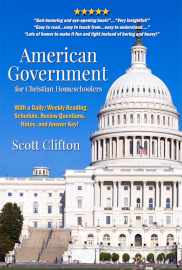American Government for Christian Homeschoolers, the textbook for a 30-week course, is written for Christian students in grades eight through twelve. It draws heavily on the Bible and on Libertarian ideas that stress the need to severely limit the government. This is an opinionated course that won’t work for non-Christians or those who believe that our present-day federal government is properly following the Constitution.
This textbook, available in either paperback or hardcover, was developed from author Scott Clifton’s online classes. Those classes are available for those who want to interact with a teacher and other students.
The table of contents also serves as the course schedule, breaking each of the book’s 29 chapters into very manageable reading assignments and questions for four days per week. Clifton’s live courses meet on the fifth day for discussion, so homeschoolers might plan for parent-student or group-class discussions that day. This course addresses many controversial issues and really needs discussion!
The course is “biased in favor of Christianity and limited, moral government,” as Clifton states on page 11. He refers to the Bible and biblical principles, even including a praying-hands emoji occasionally to remind students to pray for particular people in government, communities, and their families.
In the second lesson, he clearly states the two purposes of government: “1. To punish violence, harm, and theft” and “2. To provide justice.” He states that everything else the government does is overstepping its bounds, using examples like educating children and telling employers how much they must pay employees. I realize that some of my readers might disagree with some of his points since they are taken for granted as legitimate government responsibilities by most people. However, Clifton takes a strict interpretation of how a limited government should function. On page 9, he explains that Christians have often been a part of the problem in allowing the government to overstep its boundaries. He points, for example, to the New England Puritans who gave magistrates the power to punish “idolatry, blasphemy, heresy…[and] profanation of the Lord’s Day” as stated in their 1648 Platform of Church Discipline. Challenging a prominent view of many Christians, Clifton says that church and state should be separate because their functions are so different—a topic that deserves serious debate over where Christians would draw the line if they believe the two should not be separate.
Clifton quotes from primary sources (sometimes at length) and the Bible, as well as from writers, such as Aristotle, John Locke, Montesquieu, and Frederic Bastiat, who influenced our Founding Fathers. The Articles of Confederation and the Constitution are included at the end of the book.
The first four chapters explore biblical ideas about government, discussions about government in ancient cultures (especially Greece and Rome), the influence of the Reformation and Renaissance, and philosophical ideas and key people who influenced our Founding Fathers. When discussing the influence of the Reformation and Renaissance, Clifton attributes the emphasis on the individual solely to the Renaissance, overlooking the likely precursor, the Reformation. Clifton himself writes about the Reformation’s rejection of church authority and reliance on the individual to read and interpret Scripture for him or herself, overlooking the resultant resistance to civil authorities and stress on individualism that arose as a result. (See pages 25 and 26.)
With Chapters 5 and 6, Clifton moves on to events and influences in colonial America and England that influenced our form of government. With Chapter 7, he begins an in-depth study of the Constitution and the amendments. This is not at all dry because Clifton discusses the issues that provoked the articles of the Constitution and each amendment. He balances the heavy course content with humor, stories, and thought-provoking scenarios. Discussions relating to current events are sometimes presented very creatively. For example, a fictional newspaper article presents arguments regarding mandatory health insurance from two sides, as well as a purported comment from a Supreme Court Chief Justice (p. 135). In another instance, the Ninth Amendment which says, “The enumeration in the Constitution, of certain rights, shall not be construed to deny or disparage others retained by the people,” is brought to life with a scenario about babysitting that shows the impossibility of delineating rules for every conceivable situation (p. 138-139). Clifton argues that our Founding Fathers wrote the Ninth and Tenth Amendments to make clear that rights default to the states and the people rather than the federal government.
Clifton writes boldly on this point, such as this instance on page 189:
The moral, just way for a government to “run” an economy is...to stay out of the way and not try to run it at all. Leave the people alone to work to produce goods. Let them buy and sell at the prices they mutually agree upon. And if buyers buy goods (like steel) from another nation like Japan, then the steel producers in America had better learn how to produce it more efficiently if they want to compete.
Clifton frequently explains how our federal government gradually increased its power and diminished that of the states, often under the influence of people like Alexander Hamilton, Supreme Court Chief Justice John Jay, Abraham Lincoln, Supreme Court Chief Justice John Marshall, and Franklin D. Roosevelt.
One or more “What Do You Think” questions follow each day’s reading assignments, such as this one on page 46: “Among the complaints against King George III (Sections 3-21), are there any that would justify a Christian’s participating in a violent revolution against him?” and this one on page 146: “Imagine you’re a Federalist. Do you have a suggestion on what the states could do to combat the Supreme Court’s exceeding its constitutional limits?”
Parents can download the free answer key using the URL on page 9. Tests are not available to students using the textbook by itself, but parents might use some or all of the Final Review questions on pages 328-330 to create their own final exam, albeit without an answer key.
Summary
American Government for Christian Homeschoolers is much more entertaining and thought-provoking than most courses on government, but it needs lively discussion that encourages students to consider Clifton’s arguments and decide whether they agree with him or not.













